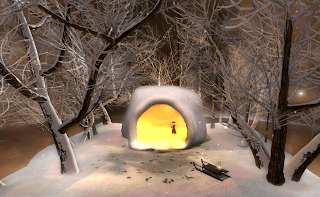
With one hand in his and the other around the little figurine in my pocket, I followed my uncle Adraste as he rushed from the cemetery directly to the Fair of Saint Laurent, the Theatre de la Foire, where the satire of La Sylphide had been mounted by our competitors with much success. A crowd had already gathered, and he hoisted me upon his shoulders to get a better view of the stage erected on the balcony against a false facade above us.
"They're already attracting bigger crowds than Monsieur Biancolleli," said a man in an extravagantly floppy straw hat who had edged over in our direction. He lifted one side of the brim and smiled up at me. "Buongiorno, Principessa Yolande Rat-Catcher."
I cried out with delight.
"Shh, you must not give me away, or I shall have to have to go on stage and apologize for my own rhymes."
"You can't possibly be worried," said my uncle, "they can't be as good as yours."
"Do I look worried?" he asked in a quaking voice, "But you know, Panard's songs are memorable, and Fagan writes remarkable French dialogue for an Irishman."
"Not Charles-François Panard, that merry drunkard..."
"Ah, I see you know him too! I say, Adraste, you keep the very best company!"
"He bought an edition of John Gay's The Beggar's Opera from me last month."
"Excellent! You will join us afterward, then, for dinner." Monsieur Biancolelli smacked his lips at me.
"But are you not incognito?"
"Good God, not from Panard! From the Riccoboni's!"
A horn fanfare announced the beginning of the performance, in the same manner as our own musicians in the Theatre Italien, but then died away on a flat note. The horn player stood up, raised his instrument over his head, reached in the bell and extracted an enormous piece of lady's underwear, then bowed to the delighted audience before tossing it to a young lady who appeared on the balcony. She caught it neatly, inspected it carefully, then declaimed,
We present our satire with honest intentions,
Aiming to delight with emulated inventions,
For it takes rare talent to be the original creator
Of verses so bad, even parody's a hurdle
When your model's on stage in that marginal theatre
run by the italienne who fits in this girdle.
"Monsieur Biancolelli, it's scandalous! She's insulting your verses!"
"Shh, I know, I know; I wrote her lines myself. And helped to fund the production."
My uncle and I burst out laughing.
"You know, I have probably made a terrible mistake. But it's hard not to write satire, and the more they laugh here, the more they'll want to come in and see what's been parodied. Besides, Panard needs the money."
The performance was an utter farce, with an obese sylph who made the entire balcony shudder, and the gnomide a dwarf made up as an old woman; Eraste a lecher and Arlequin a drunkard. The palace of the Sylphides was a tavern, and Clarice, the neglected fiancee of besotted Eraste, made an appearance as a laundress, boxed her sylph-sotted betrothed about the ears, then pulled him off stage to the applause of the audience. But the verses were very funny, and we laughed without stop, who would have cried if we didn't know M. Biancolelli had had his hand in it.
We dined that night al fresco at a guinguette, a wine shop just on the edge of the city, with stout Monsieur Panard and wiry Fagan, his collaborator, and with Monsieur Biancolelli, a few unmarried members of the company de la foire, and one or two other performers of the Theatre Italien.
"Before Riccoboni won the Hotel Borgogne, we performed with you in the fairs, but a permanent home has our levity undone, and our rhyme no longer compares. " said M. Biancolelli as a toast.
M. Panard stood up to reply, . "my friends, all things in this world shall pass; this is a law even heaven holds dear. If you doubt it now just watch my glass, for the wine it holds shall soon disappear." And he held up the most enormous wineglass of eau-du-vie, bowed to us and drained it with pleasure.
Fagan took his turn, raised his glass and addressed M. Biancolelli gravely. "Of rhyming levity you do us accuse, to some we seem to play the buffoons, but the lightest humour can do more than amuse, making ridiculous the very thing it lampoons."
The entire table gave a long, pleasurable groan at this opening volley, for it announced the continuation of la guerre des vers, which had been waged between the members of the two companies for decades. M. Biancolelli added, "If Fagan wears a sullen air, and Panard never learned to pout, 'twas only because Fagan was spare, or because Panard was stout."
They went on like this all night, back and forth, as the wine shop filled with customers attracted by the impromptu jousting, and the delighted inn-keeper bustling around refilling jugs and glasses, turning any horizontal surface he and his wife could find into a table. Merchants and students, tradesmen and apprentices were all seated together, and a gentle couple who would not identify themselves and whose livery we did not recognize, also took part, adding a couplet or two of their own. Everyone was in the highest, most excitable spirits, interrupting each other with laughter and impertinent remarks.
I wandered about the tables and chairs, content to quietly study everyone who had gathered under the stars, until I caught sight of an old man in a three-tailed wig I thought I recognized, seated at the very edge of the company where the warm lantern light and laughter faded into the cold night air, and who seemed to watch me with glittering eyes. I fled back into the crowd, that was now singing le chevalier du Guet, and clung to my uncle, then fell asleep in his arms.
























